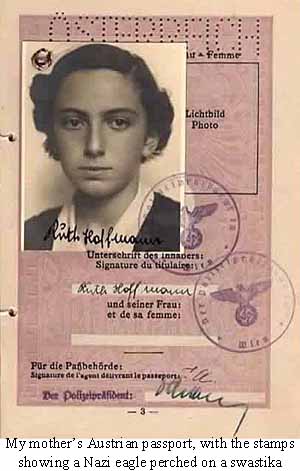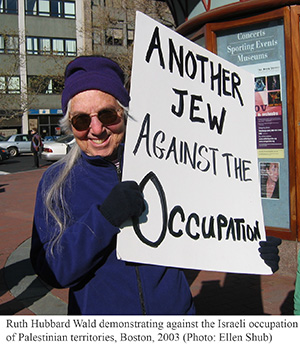I normally write as a white American, but in the weeks following October 7 I have been writing specifically as a Jew, because I cannot help reacting as a Jew to what is happening in Israel/Palestine. I have friends and relatives there, and that affects my reaction; I also see and hear people all around me talking about what has happened and could happen to “the Jews,” meaning people like me, not only in Israel, but elsewhere.
 My mother grew up in Vienna. She was 14 years old when the German army marched in and was greeted with parades. She spent the next weeks running errands for her parents because it was dangerous for them to be out in the streets. They were not only Jewish, but longtime leftists, and they realized immediately that they would have to leave. It was easier in those first months, and they got out and got to the United States. My grandfather helped other relatives to get out. He tried to help his favorite brother and my mother’s favorite cousin, but for various reasons they did not want to leave until it was too late. They were shipped east in the cattle cars, and murdered.
My mother grew up in Vienna. She was 14 years old when the German army marched in and was greeted with parades. She spent the next weeks running errands for her parents because it was dangerous for them to be out in the streets. They were not only Jewish, but longtime leftists, and they realized immediately that they would have to leave. It was easier in those first months, and they got out and got to the United States. My grandfather helped other relatives to get out. He tried to help his favorite brother and my mother’s favorite cousin, but for various reasons they did not want to leave until it was too late. They were shipped east in the cattle cars, and murdered.
My mother lived with that experience until she died in her nineties. She always thought of herself as a refugee. She found safety in the United States, but never felt at home there. She also found that in the United States she was treated as a white person, and other white people talked to her about Black people the way the German Austrians talked about the Jews. Even many Jewish Americans talked about Black people the way German Austrians talked about Jews.
She had experienced the Nazis first-hand, and she saw that many white Americans were acting like Nazis. So she did not raise me and my sister to be afraid of Nazis, or to ask who would hide us from the Nazis — she raised us not to be Nazis. She taught us to despise militarism and racism, and to stand up for people who were excluded or oppressed, for immigrants, for refugees, for people treated as “different.” To her, those people were the Jews, the people like her, whoever they might be.
No moral compass is perfect. Sometimes it is hard to figure out who the “good guys” are. Sometimes there are no good guys. But there always is the option of choosing not to be the Nazis – of saying that no matter how far one is pushed, how desperate or angry one may feel, or how frightened, there are things one will not do.
Our mother taught us that the bombings of Hiroshima and Nagasaki were unforgivable atrocities, like the Holocaust – that we must do whatever we could to prevent anything like that happening again. When I read “Slaughterhouse Five” and asked her about the firebombing of Dresden, she said it was the same—an atrocity, targeting a civilian population. The fact that they were Germans, many of them presumably Nazis, didn’t excuse the choice to wipe them out, men, women, and children. Blindly murdering tens or hundreds of thousands of people because of who or where they were was behaving like the Nazis.

My mother was not particularly unusual. Many refugees and survivors from the Nazi Holocaust had similar reactions. It became almost a cliché of Israeli writing about the formation of the Jewish state and the expulsion of Palestinians: the moment when a Jewish soldier looked around him and realized he was now behaving like the Nazis and the Palestinians were the Jews. Some writers took that meditation to its (to me) logical conclusion, and turned against the Zionist state project—some left; some continued to live in Israel/Palestine, but worked to shape a multiethnic, multireligious future, whether in one or two states. Other writers took a (to me) more dubious lesson, concluding that they were doing something dreadful but had no choice: the frequent analogy was that the Jews jumped out of a burning building and unfortunately landed on someone else’s head; they hurt a bystander and were sorry for that, but the essential fact was that they had to jump.
I continue to hear many people echoing that claim: that the Israelis are doing something terrible, but have no choice. But, more and more, I’m hearing a different claim: that the Palestinians—or more specifically Hamas—are the Nazis. I don’t have to celebrate or excuse Hamas to reject that analogy. If the Nazis had been a bunch of desperate fanatics carrying out occasional horrific attacks on civilians, they would barely be remembered, because there have been hundreds of groups like that, all over the world. What distinguished the Nazis was not that they hated Jews – it is a commonplace of Jewish history that we have always had enemies – but that they harnessed the power of a modern nation-state and modern technology to kill not hundreds or thousands, but millions.
I am not going to jump from one Nazi analogy to another. The fact that many people, in many wars, have had moments when they realized they were behaving like Nazis does not mean what they did was comparable. The Nazis committed a methodical genocide that had never been attempted on that scale and has never been equaled—they were by no means the only nation to commit or attempt genocide, but managed it with a cool efficiency that was unique, and in that sense uniquely horrific.
But, as my mother’s son, I do think about that history and turn to it for guidance. My mother opposed the death penalty, unconditionally: she did not believe the state should ever kill people, calmly and efficiently, no matter what they had done—much less kill their entire families, their children. She had a particular horror of “civilized” states killing with modern efficiency: if a nation was dropping bombs on people who had no airplanes, she always imagined herself under the bombs, not in the airplanes. She could imagine herself in Dresden or Hiroshima; she could have imagined herself in a kibbutz on October 7, hiding in a safe room, but would have found it far easier to imagine herself in Gaza, under the bombs. I find it far easier to imagine myself in Gaza, under the bombs. It is a much more common fate, in our modern world; few of the people who die in modern wars see the people who are killing them, nor do the killers see them.
A few years ago, I went to Poland, to Przemysl, to see where my grandmother came from, and also my father’s father. Some Jewish friends were puzzled that I would feel that desire, or feel any closeness to that place. They said, “the Poles were even worse than the Germans.” That comment seemed bizarre to me, so they sent me stories—pornographically violent stories, about peasants disemboweling Jewish women with scythes, or herding Jews into a synagogue with clubs and setting it on fire. Those stories were horrible, but the implication was worse: that peasants who were used to slaughtering animals with butcher knives and slaughtered Jews the same way were worse than civilized Germans who bought their meat in stores and sent Jews off to be efficiently gassed by the millions. To me, that is what defines being “like the Nazis”— methodical, state-sanctioned killing, using the latest technology and wiping out entire families without even having to see the people you are killing.
That is not about one state or another. It is about having the power to kill with efficiency, with clean hands, and is the way the vast majority of people have been killed in most of the wars in my lifetime. And yes, I think it is even more horrible than the old-fashioned kind of killing, because it is easier to pretend that you are not doing it, or would rather not be doing it—and when you can pretend you are not doing it, you can do much more of it, and turn off the images, or dismiss them as propaganda, or lament the deaths, but as numbers, not as people. I see the pictures of the Israelis killed on October 7, with their names and their biographies. The pictures from Gaza are of entire neighborhoods destroyed, masses of wounded and dead people—I hear numbers rather than names: five thousand killed, ten thousand killed. It is the language of statistics, the language of the slaughterhouse, of how many hamburgers McDonalds has sold. Most of us feel a more visceral horror at the death of one person we know by name and face than the deaths of an abstract thousand or ten thousand people. But I also find it easier to imagine myself under the bombs than in the airplanes. And all I want is for the bombing to stop.
That is not the answer to any longterm problems, or to trauma and enmities that go back decades and generations. But it is the first, vital, immediate answer to what must be done now, today. Stop the Killing. Then, do whatever it takes to reduce the hatred, the trauma; do the long, hard work of building, which is always harder and more time-consuming than destroying. But first, stop. Stop the bombing. Get food, water, fuel, and medical supplies to the people who are trapped and dying. That is not an answer to all the deep and painful history, or the infinite questions of what to do next — but it is the only answer that matters right now.
